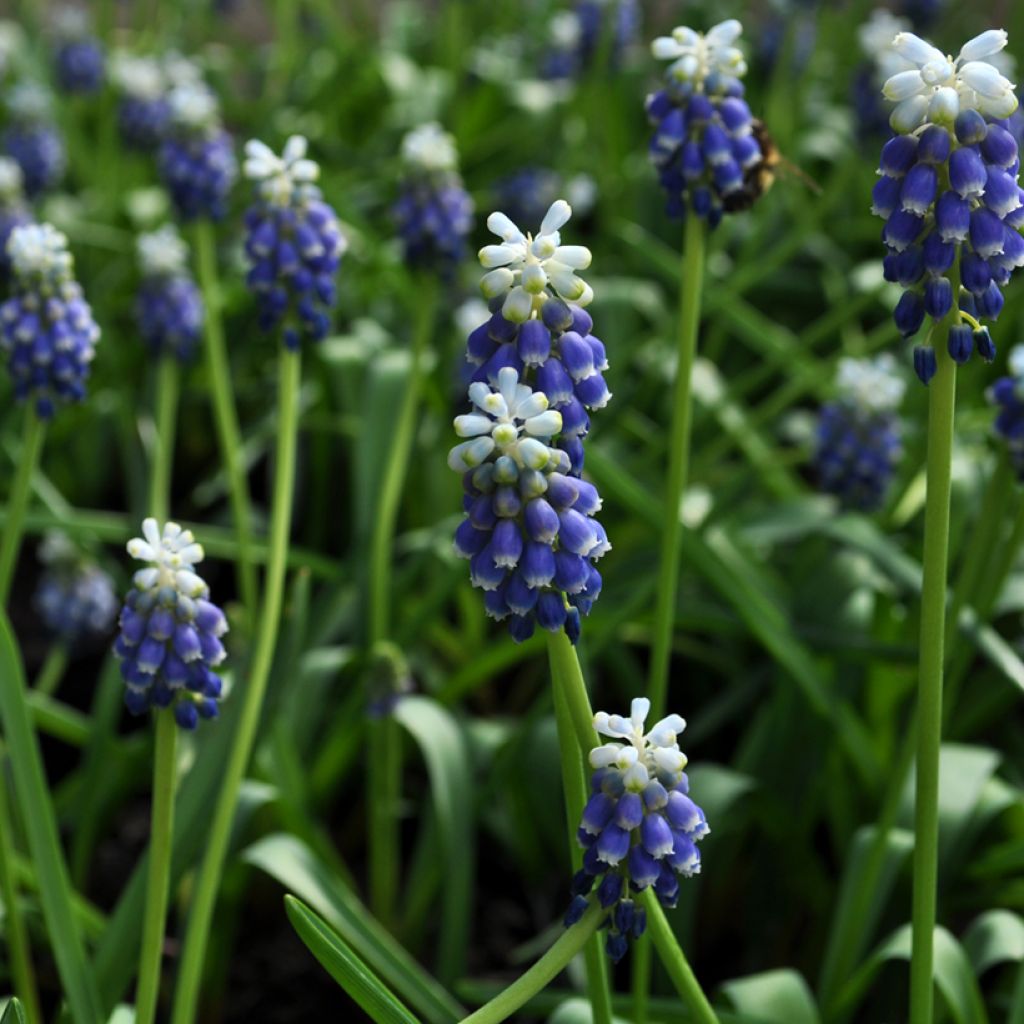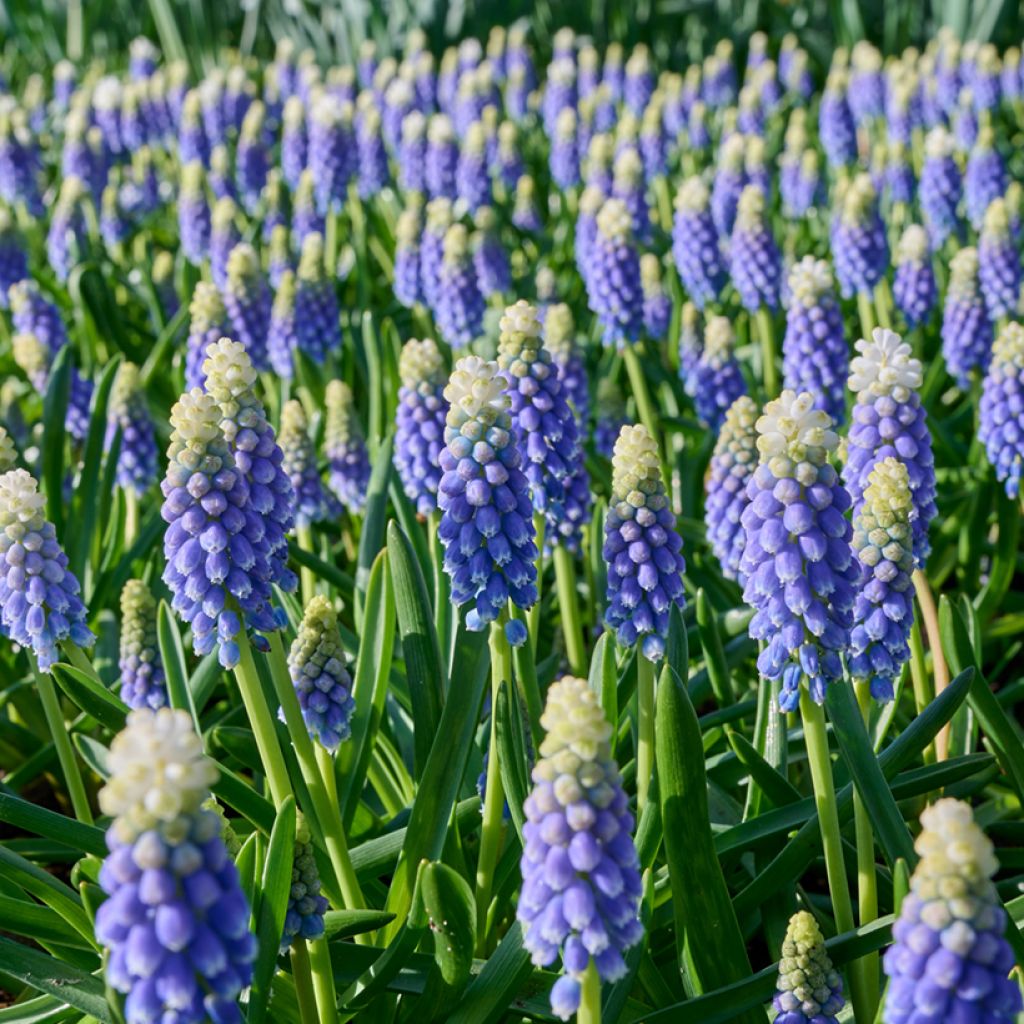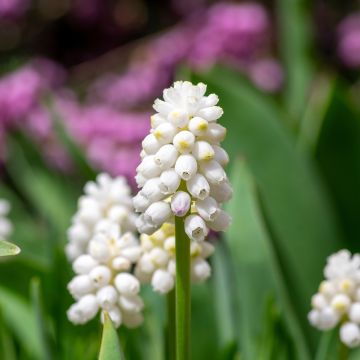

Muscari armeniacum Touch of Snow


Muscari armeniacum Touch of Snow
Muscari armeniacum Touch of Snow
Muscari Touch of Snow
Grape Hyacinth, Baby's Breath
Special offer!
Receive a €20 voucher for any order over €90 (excluding delivery costs, credit notes, and plastic-free options)!
1- Add your favorite plants to your cart.
2- Once you have reached €90, confirm your order (you can even choose the delivery date!).
3- As soon as your order is shipped, you will receive an email containing your voucher code, valid for 3 months (90 days).
Your voucher is unique and can only be used once, for any order with a minimum value of €20, excluding delivery costs.
Can be combined with other current offers, non-divisible and non-refundable.
Why not try an alternative variety in stock?
View all →This plant carries a 6 months recovery warranty
More information
We guarantee the quality of our plants for a full growing cycle, and will replace at our expense any plant that fails to recover under normal climatic and planting conditions.
Would this plant suit my garden?
Set up your Plantfit profile →
Description
Muscari armeniacum 'Touch of Snow' is a delightful little hybrid that offers small conical spikes of flowers with a blue gradient, darker towards the bottom and almost white at the top. The flowers first open from green buds and the tips of the floral spikes appear white before darkening to become medium blue. This creates a distinctive and eye-catching bicolour effect. The nectar-rich and slightly fragrant flowering occurs in March. This small bulbous plant rests in the summer, indifferent to heat.
Derived from Muscari armeniacum, 'Touch of Snow' is a hybrid belonging to the asparagaceae family. This small bulb produces a basal rosette of very narrow, gutter-shaped, dark green leaves. Each rosette emits 3 to 5 floral stems on a mature and well-developed bulb. The 15 cm tall floral stems bear 20 to 40 small urn-shaped flowers. The inflorescence is a cluster of flowers 2 to 6 cm long and about 1.5 cm wide, exhaling a heavy, heady fragrance. The urn-shaped flowers are small, measuring only 5 to 6 mm in length. They are tightly packed together, forming a narrow and dense cone. The small blue urns are bordered in white. This bulb naturalises slowly but surely in light soil, without ever becoming invasive.
Muscari is a small, undemanding plant that should be valued for of its delightful range of soft or vibrant colours. 'Touch of Snow' is situated between the two with its range of intense and soft blue. Its great resistance to cold, drought, and shade allows it to be used in many situations: in woodland, at the base of trees, as a border to highlight a pathway, in a rockery with heathers for example, or in Japanese-style gardens. It also grows very well in pots, on a windowsill or balcony. It is so accommodating that it will forgive a lack of watering and thrive in neglected or weekend gardens. Its flowers are very beautiful alongside the trumpets of daffodils, forget-me-nots, the fragrant clusters of early blue hyacinths (Blue Pearl, Delft Blue), or the pink and white cups of triumph tulips. You can also plant muscaris in clusters in a lawn. It multiplies rapidly in good, rich, and well-draining soil.
Report an error about the product description
Muscari armeniacum Touch of Snow in pictures


Plant habit
Flowering
Foliage
Botanical data
Muscari
Touch of Snow
Asparagaceae
Grape Hyacinth, Baby's Breath
Cultivar or hybrid
Other Muscari
View all →Planting and care
Plant your Muscari Touch of Snow as soon as possible in well-drained soil. Loosen the soil deeply. Plant at a depth of 8 cm (Bulbs should be covered with twice their height of soil). Space the bulbs 8 cm apart, making sure they do not touch each other. Choose a sunny exposure for better flowering. Muscari armeniacum is undemanding on the nature of the soil and perfectly hardy in all regions, even dry in summer. Divide the bulbs every 4 years at most. If you grow it in pots, you will need to water it regularly and feed it after flowering so that the bulb replenishes its reserves.
Planting period
Intended location
Care
This item has not been reviewed yet - be the first to leave a review about it.
Haven't found what you were looking for?
Hardiness is the lowest winter temperature a plant can endure without suffering serious damage or even dying. However, hardiness is affected by location (a sheltered area, such as a patio), protection (winter cover) and soil type (hardiness is improved by well-drained soil).

Photo Sharing Terms & Conditions
In order to encourage gardeners to interact and share their experiences, Promesse de fleurs offers various media enabling content to be uploaded onto its Site - in particular via the ‘Photo sharing’ module.
The User agrees to refrain from:
- Posting any content that is illegal, prejudicial, insulting, racist, inciteful to hatred, revisionist, contrary to public decency, that infringes on privacy or on the privacy rights of third parties, in particular the publicity rights of persons and goods, intellectual property rights, or the right to privacy.
- Submitting content on behalf of a third party;
- Impersonate the identity of a third party and/or publish any personal information about a third party;
In general, the User undertakes to refrain from any unethical behaviour.
All Content (in particular text, comments, files, images, photos, videos, creative works, etc.), which may be subject to property or intellectual property rights, image or other private rights, shall remain the property of the User, subject to the limited rights granted by the terms of the licence granted by Promesse de fleurs as stated below. Users are at liberty to publish or not to publish such Content on the Site, notably via the ‘Photo Sharing’ facility, and accept that this Content shall be made public and freely accessible, notably on the Internet.
Users further acknowledge, undertake to have ,and guarantee that they hold all necessary rights and permissions to publish such material on the Site, in particular with regard to the legislation in force pertaining to any privacy, property, intellectual property, image, or contractual rights, or rights of any other nature. By publishing such Content on the Site, Users acknowledge accepting full liability as publishers of the Content within the meaning of the law, and grant Promesse de fleurs, free of charge, an inclusive, worldwide licence for the said Content for the entire duration of its publication, including all reproduction, representation, up/downloading, displaying, performing, transmission, and storage rights.
Users also grant permission for their name to be linked to the Content and accept that this link may not always be made available.
By engaging in posting material, Users consent to their Content becoming automatically accessible on the Internet, in particular on other sites and/or blogs and/or web pages of the Promesse de fleurs site, including in particular social pages and the Promesse de fleurs catalogue.
Users may secure the removal of entrusted content free of charge by issuing a simple request via our contact form.
The flowering period indicated on our website applies to countries and regions located in USDA zone 8 (France, the United Kingdom, Ireland, the Netherlands, etc.)
It will vary according to where you live:
- In zones 9 to 10 (Italy, Spain, Greece, etc.), flowering will occur about 2 to 4 weeks earlier.
- In zones 6 to 7 (Germany, Poland, Slovenia, and lower mountainous regions), flowering will be delayed by 2 to 3 weeks.
- In zone 5 (Central Europe, Scandinavia), blooming will be delayed by 3 to 5 weeks.
In temperate climates, pruning of spring-flowering shrubs (forsythia, spireas, etc.) should be done just after flowering.
Pruning of summer-flowering shrubs (Indian Lilac, Perovskia, etc.) can be done in winter or spring.
In cold regions as well as with frost-sensitive plants, avoid pruning too early when severe frosts may still occur.
The planting period indicated on our website applies to countries and regions located in USDA zone 8 (France, United Kingdom, Ireland, Netherlands).
It will vary according to where you live:
- In Mediterranean zones (Marseille, Madrid, Milan, etc.), autumn and winter are the best planting periods.
- In continental zones (Strasbourg, Munich, Vienna, etc.), delay planting by 2 to 3 weeks in spring and bring it forward by 2 to 4 weeks in autumn.
- In mountainous regions (the Alps, Pyrenees, Carpathians, etc.), it is best to plant in late spring (May-June) or late summer (August-September).
The harvesting period indicated on our website applies to countries and regions in USDA zone 8 (France, England, Ireland, the Netherlands).
In colder areas (Scandinavia, Poland, Austria...) fruit and vegetable harvests are likely to be delayed by 3-4 weeks.
In warmer areas (Italy, Spain, Greece, etc.), harvesting will probably take place earlier, depending on weather conditions.
The sowing periods indicated on our website apply to countries and regions within USDA Zone 8 (France, UK, Ireland, Netherlands).
In colder areas (Scandinavia, Poland, Austria...), delay any outdoor sowing by 3-4 weeks, or sow under glass.
In warmer climes (Italy, Spain, Greece, etc.), bring outdoor sowing forward by a few weeks.

































